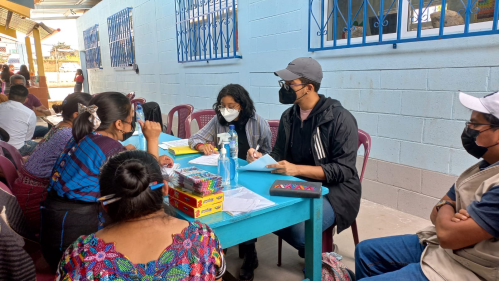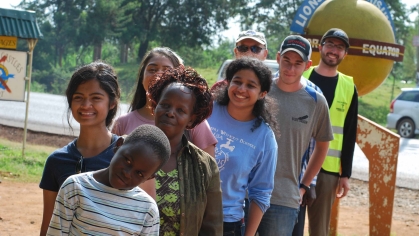Guatemala’s literacy rate of just 74.5% is the lowest in Central America, according to UNESCO. Education is seriously underfunded by the government, with many schools in such poor conditions that children are unable to learn in safe, healthy environments.
A team of students from the Rutgers Chapter of Engineers Without Borders USA (EWB) determined to alleviate this situation in Chi Elias, Guatemala, by designing and building two classrooms for students in grades 1-5. The school’s students were walking up to four miles round trip every day to school only to learn in structurally unsound, poorly ventilated classrooms that were making them sick. And with no meeting space for the principal, classes are often cancelled to accommodate meetings.
“This project has been in the works since a 2018 trip assessed the feasibility of accomplishing the project with our funds, resources, and time constraints,” says RU EWB chapter president David Garner.
This past summer, members of the current team returned to Guatemala to visit the finished classrooms, which were completed in March 2022. “The pandemic put all projects on hold, but we were able to work remotely with the country office, transferring funds and documentation, so that we could continue the work during the pandemic,” Garner explained. “They, in return, gave us images of the progress of the build.”
“It’s one thing to see pictures of the project, but it’s another thing to be there in person and really be able to see the classrooms and the cumulative work of previous members of the project,” says Cindy Leal, a co-lead for the project. “You could tell how much the school directors and teachers cared for their students and how pleased they were able to provide them with a safe and comfortable learning environment – something that would have been very hard to achieve on their own.”
A Passionate Commitment
For Leal, a mechanical engineering major who is also co-lead of the chapter’s Tanzania project, joining the EWB Guatemala project was personal. “My parents grew up in Mexico and often described the lack of funding for educational infrastructure,” she recalls. “I wanted to help accomplish the project goal of providing a safe learning environment for students in any way I could.”
Fellow co-lead and materials science and engineering major Shivani Sunkireddy is passionate about educating children. While she’s helped Save Indian Farmers raise funds to educate farmers’ children in rural India, she hasn’t been able to stay as involved with the organization while studying as an international student at Rutgers. “The Guatemala project has been an ideal project for me to continue working on something I’m passionate about,” she says.
Serving the Community
During the summer trip, the SoE team collected data from the site to be certain it matched up with initial construction plans. “EWB is committed to ensuring the community’s satisfaction with the project, so we also spoke with community leaders, directors, students, parents, and teachers about the project and on any areas in which we could improve,” says Leal.
Members of the community pointed out the need to build a fence around the school to protect it from thefts of everything from computers to lightbulbs. Sunkireddy is hopeful that building a fence might be the chapter’s next project in Guatemala.
A Gratifying Experience
Despite having contracted COVID-19 upon his arrival in Guatemala, the summer trip was nonetheless transformative for Garner, who was eventually able to join the group to visit a construction site for another Guatemala project. “With our spare time, we visited some historical sites and took in the beautiful volcanoes and mountains of Guatemala,” the mechanical engineering major reports.
Even more important to him is the positive impact EWB has made in communities without interfering with their culture or way of life. “By working with the community and being in this long-term relationship and communication, we are able to help the way they want to be helped,” he says. “It is incredible to know that our work will help the education of generations to come.”
For Sunkireddy, the trip was especially memorably because they were able to meet directly with the community. “The most gratifying part of this project was being able to see how excited community members and students were to see us – and how grateful they were that we were able to push for this project to happen,” she insists. “They kept telling us how long they’ve wanted this to happen and how they can’t believe it is finally completed.”



